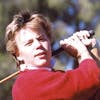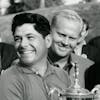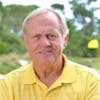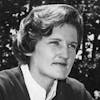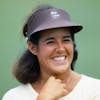Marlene Streit - Part 2 (The 1956 Women's U.S. Amateur)
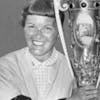
In this second part of our captivating interview with the legendary Canadian amateur golfer, Marlene Streit, we delve even deeper into the remarkable journey of a golfing icon. Join us as we continue to trace Marlene's extraordinary career from the late 1950's to the late 1960's.
The episode kicks off with a look back at Marlene's numerous victories, showcasing her unwavering commitment to the game and her dedication to achieving excellence. We explore her experiences competing in international tournaments, including her memorable trip to the Old Course at St. Andrews as part of the Commonwealth team—an unforgettable moment for any golfer.
As the conversation unfolds, Marlene shares her insights into some of the golfing greats of her time. Hear her reflections on the incredible careers of players like Mickey Wright and Kathy Whitworth, who amassed an astounding number of tournament wins and left an indelible mark on the sport.
But it's not just the women's game that Marlene discusses; she also highlights the standout male Canadian golfers she had the privilege of knowing, including George Knudson, Stan Leonard, and Mike Weir. Her reminiscences provide a unique window into the Canadian golfing landscape during her era.
Marlene's warm and engaging storytelling paints a vivid picture of the golfing world from a bygone era, capturing the essence of the sport's history and the camaraderie among players. Her encounters with golf legends like Ben Hogan and Moe Norman are sure to leave you enthralled.
Join us on this journey through time as we continue to uncover the life and career of one of golf's true trailblazers. Whether you're a golf aficionado or just love a good story, this episode is a must-listen. Marlene Streit's indomitable spirit and passion for the game shine through, making this installment of "FORE the Good of the Game" an absolute treat for all golf enthusiasts.
Follow our show and/or leave a review/rating on:
Our Website https://www.forethegoodofthegame.com/reviews/new/
Apple Podcasts https://podcasts.apple.com/us/podcast/fore-the-good-of-the-game/id1562581853
Spotify Podcasts https://open.spotify.com/show/0XSuVGjwQg6bm78COkIhZO?si=b4c9d47ea8b24b2d
Google Podcasts https://podcasts.google.com/feed/aHR0cHM6Ly9mZWVkcy5idXp6c3Byb3V0LmNvbS8xNzM3Mjc1LnJzcw
About
"FORE the Good of the Game” is a golf podcast featuring interviews with World Golf Hall of Fame members, winners of major championships and other people of influence in and around the game of golf. Highlighting the positive aspects of the game, we aim to create and provide an engaging and timeless repository of content that listeners can enjoy now and forever. Co-hosted by PGA Tour star Bruce Devlin, our podcast focuses on telling their life stories, in their voices. Join Bruce and Mike Gonzalez “FORE the Good of the Game.”
Thanks so much for listening!
Music playing 00:00
Mike Gonzalez 00:15
I think there's a lady that you should drive it 100 yards by you, that won it in 1960 Do you remember that?
Streit, Marlene 00:22
1956 That was 1956.
Mike Gonzalez 00:25
Yeah, that you won it in 56 but this lady won it in 1960.
Streit, Marlene 00:31
Oh, are you talking about the intercollegiates now or are you talking about the Great Gundy?
Mike Gonzalez 00:37
I'm talking about the Great Gundy winning the intercollegiates in 1960.
Streit, Marlene 00:41
Oh, okay, I didn't play then I wasn't there. But she out drove me...
Mike Gonzalez 00:46
So, you don't care.
Streit, Marlene 00:47
No, she says she outdrove me by 100 yards when we played in 1956. And so anyway, at my induction thing at the World Golf Hall of Fame, when she introduced me, she was telling them how far you outdrove me, and then I got up there and said you know, if she hadn't been so busy pacing and how far she hit it by me I wouldn't even be here now. But we're great friends. And we really have fun. And I remind her all the time that I won, I won in 1956 but she won, but she won 10 years later. So that's alright.
Devlin, Bruce 01:32
We're talking about the U.S. Women's Amateur Championship at Meridian Hills Country Club where she beat the Great Gundy two and one. So quite an accomplishment.
Streit, Marlene 01:44
Yeah, it sure was because oh my god, she was only 17 but she was busy pacing how far she could hit the past me. Served her right because I could hit my four-wood right in there as close to she could hit her seven iron.
Mike Gonzalez 02:04
Yeah, and oftentimes, that's what you were faced with. Right? But it must not have bothered you at all. But it must have ...
Streit, Marlene 02:09
It must have driven the opponent's crazy wouldn't you think? I never thought about it at the time. But I mean, now that I think about it, God, that would drive me crazy. And then if I missed the green, I could chip and one putt. I was a pretty good short game player. Had to be. Couldn't hit it very far. You must have been good with everything. No, you know the shortest distance between two points is a straight line.
Devlin, Bruce 02:41
Yeah, yeah, that's right.
Streit, Marlene 02:43
I hit it pretty straight.
Mike Gonzalez 02:45
So, you didn't work the ball much left to right, right to left or did you if you needed to?
Streit, Marlene 02:51
Well, I could hit it around trees if I had to. But no working it? No. Working it straight? Yes.
Devlin, Bruce 03:02
Yeah, that's good
Mike Gonzalez 03:04
Because back with the equipment that you guys played. You could work it if you needed to couldn't you.
Streit, Marlene 03:12
Yeah, because we played with balata balls and steel shafts. I think that ball was a balata ball I think the ball, it just kind of got out of shape didn't it?
Mike Gonzalez 03:28
Well, like Bruce, did you have the steel ring that you used to put your balls through to see if they were round?
Streit, Marlene 03:34
No.
Devlin, Bruce 03:36
You didn't?
Streit, Marlene 03:37
No.
Devlin, Bruce 03:37
Oh, dear. You've probably played some golf...
Streit, Marlene 03:41
Hey, I just played just like your show. I just played for the love of the game. I was having fun.
Mike Gonzalez 03:47
Well, that's great. Well, just finishing up with that U.S. Women's Amateur that you won in1956. You also played JoAnne in 1966 and set a USGA record for the longest finals match, 41 holes, in that final against JoAnne Gunderson Carner in 1966. Of course, you were on the wrong end of that one, but that was alright That must have been some match.
Streit, Marlene 04:20
Well she skipped it across the water someplace on 16 or something. She was lucky. No, she was a great player. And we had a great match. It was good. Yeah, how many extra holes did we play?
Mike Gonzalez 04:38
Well, you played five extra holes. You went 41 holes.
Streit, Marlene 04:41
Yeah, right. We did.
Mike Gonzalez 04:44
It was a record at the time. I assume it's still a record. I probably ought to check that but that was a record for the longest finals match in that event. You may remember this but Anne Gregory became the first African-American to compete in this event that year. Do you remember that?
Streit, Marlene 05:01
Yes I do, Yea. Sorry, I can't comment so much on it because I probably didn't pay much attention.
Mike Gonzalez 05:11
It was probably a much bigger deal in 1956 than it would have been in 2023.
Devlin, Bruce 05:18
For sure.
Streit, Marlene 05:20
I don't know if they made such a big deal about. I don't recall.
Mike Gonzalez 05:27
Well, it was certainly a pioneering appearance for her during that championship.
Streit, Marlene 05:32
I remember that, I remember. I sort of remember.
Mike Gonzalez 05:37
You're finishing up college of course at college, at Rollins, a lady named Betty Rowland, also won the intercollegiates in 1950 from Rollins, and there was some pretty famous alums from Rollins over the years hasn't there been?
Streit, Marlene 05:54
Yes. Yeah. Hollis went there. Hollis Stacy, didn't she?
Devlin, Bruce 06:03
Jane Blaylock,
Mike Gonzalez 06:04
Who we've had on the show, of course, we've had Hollis on the show. Alice and Pete Dye were there.
Streit, Marlene 06:08
Yeah. Yeah. They were they were ahead of me. Yeah. And Betty. Betty Rowland was there.
Mike Gonzalez 06:20
You mentioned your big sister Barbara McIntire. She was there.
Streit, Marlene 06:24
No, I was her big sister. She came to Rollins after I did.
Mike Gonzalez 06:35
She was your little sister,
Streit, Marlene 06:37
Little sister at the sorority, yeah.
Devlin, Bruce 06:39
Yeah.
Mike Gonzalez 06:41
I gotta get that right, and then you remember Mr. Rogers? He was from Rollins.
Streit, Marlene 06:47
Yeah. I didn't know that there was another actor...
Mike Gonzalez 06:52
Some of our older listeners will remember Buddy Ebsen who portrayed Jed Clampett in the Beverly Hillbillies.
Streit, Marlene 07:00
Right, did he go there too? It was a great school. You know, it was only about 2000. enrollment.
Mike Gonzalez 07:11
So you finished up there in 1956. Are you thinking about playing professional? Are there ladies coming after you encouraging you to come out on the LPGA Tour. What was going on back then?
Streit, Marlene 07:22
No. Well, you know, in 1950, after I won the Canadian, when did the LPGA start in 1950?Yeah. 1950? Yes. I played I think in the Tampa Women's Open, have I said this already? The Tampa Women’s Open?
Mike Gonzalez 07:43
Yeah, you had mentioned that to me yesterday, when we were chatting about playing on the Tampa Open in 1951 did you say?
Streit, Marlene 07:48
Well, no, I think 1952 because they invited me because I'd won the Canadian. And 1952 so my mother drove me down. And I played and then that's when I first met, you know, the Babe and George and Betsy Rawls, you know, and all the founders were there, Bev Hanson, I mean, the whole crowd. And I suppose they tried to romance me to join the tour. I really didn't like the lifestyle. I didn't like to travel. I never played in maybe more than six tournaments a year, at most, ever. And so I didn't sort of follow the amateur tour and all that stuff. But they were really, really nice to me there and it was great and I played in that Tampa Women's Open a few times, after I went down to Rollins too. Yeah, they, they tried. I did not want to live out of a suitcase. And besides, I knew I wanted to get married and I knew who I wanted to marry.
Mike Gonzalez 09:11
You had a plan!
Streit, Marlene 09:12
I had a plan.
Mike Gonzalez 09:15
Well, back to the Founders. Of course, there were 13 ladies that to help get the LPGA started in 1950. There also
Streit, Marlene 09:23
They were all there in 1952.
Mike Gonzalez 09:25
People like Betsy Rawls, who we just lost this past week. She was right there at the beginning. She's not credited as being a Founder, but she just as well could have been because she got started just right thereafter. But I'm sure you were pleased to learn that the founders that weren't already inducted in the World Golf Hall of Fame will go in as a group next June when the new Golf Hall of Fame opens up in Pinehurst North Carolina.
Streit, Marlene 09:52
Yeah, that's interesting. That's good. I mean, it should have been done long time ago.
Mike Gonzalez 09:57
Well it will be great recognition for the likes of Alice Bauer, Marlene's sister and Betty Danoff, Helen Detweiler, Helen Hicks, Opal Hill., Sally Sessions, Shirley Spork. Those will be the names that will be inducted next year.
Streit, Marlene 10:17
I'm surprised Shirley hasn't been inducted before this anyway.
Mike Gonzalez 10:22
Well, great recognition for those ladies. So, here we are. We're in 1956. You're finishing school. You've just won the intercollegiates. You've just won the U.S. Women's Amateur over the Great Gundy. And did you have any idea at the time, what sort of golf life was still ahead of you?
Streit, Marlene 10:47
No. I must be really stupid. I don't know. I didn't think about it. I guess I just once summer came I played golf. Yeah. I mean, even when I...
Devlin, Bruce 11:02
What an attitude.
Streit, Marlene 11:03
We even when I moved, you know, when I got married in 1957. And we moved to Toronto, and I had a few honorary memberships there. So I played and I just played golf. And then you know, I play in the provincial tournament and maybe the Canadian and then sometimes I go and play in the U.S. Open. That was fun. Yeah, that was always fun to play with the pros. Then we finally had a really good Canadian professional, that the du Maurier and the Peter Jackson in Canada. That was fun.
Mike Gonzalez 11:44
Bruce, I guess what struck me about Marlene's comment about maybe played six tournaments a year. Well, she must have won about half of them.
Devlin, Bruce 11:51
Yeah, or more.
Streit, Marlene 11:51
Well, I didn't go into a tournament to lose it. I never played in a tournament to lose it. But, you know, I mean, I know a lot of people just go and play in a lot of tournaments. No, I went for purpose. I always had a purpose.
Mike Gonzalez 12:12
You played in a lot of U.S. Opens didn't you?
Streit, Marlene 12:14
I played in quite a few, yeah. I was low amateur once, I think. But I really enjoyed that because I got to play with. You know, Carol Mann and all the good players. I really enjoyed that.
Mike Gonzalez 12:31
Well, the years go on, we're in the late 1950's, 1957, 1958. You keep racking up victories. As we get to 1959 in addition to about four or five tournaments, you win that year, you also travel with the Commonwealth team to the Astor Cup, and get to play at the Old Course.
Streit, Marlene 12:51
Right. That was the very first official Commonwealth tournament. Yeah, that was great fun. Yeah. We went over there. And they entered us in a handicap tournament at Wentworth and I didn't know it was a handicap tournament. In the meantime, I'm playing from a plus three handicap. Hello. And so well, of course, you know, me, I played to win regardless. I was giving all these shots and I won it. But by the time I got to the British at Birkdale the next week, I think Mrs. Brown from Calcutta beat me in the first round. And I was finished but, you know, you can only do what you can do. And then Ada...
Mike Gonzalez 13:52
Your team finished second, I think in that Astor Cup you competed in at the Old Course. And Bruce Devlin beat you by a year because he got a chance to go to the Old Course in 1958.
Streit, Marlene 14:06
Oh, great. Yeah.
Devlin, Bruce 14:08
And you mentioned Super Constellation that little plane you had.
Streit, Marlene 14:14
Yeah, did you fly in that?
Devlin, Bruce 14:16
In 1958, I left Sydney, Australia in a Super Constellation heading for Scotland. Right? Yeah. 58 hours later I arrived in Scotland. So we made seven stops on the way, back then, because those planes couldn't fly the distance that they do today, so
Streit, Marlene 14:42
So you stopped in Fiji
Devlin, Bruce 14:43
I remember it very well. Yeah.
Streit, Marlene 14:47
Oh, goodness gracious.
Mike Gonzalez 14:51
So Marlene, Darlene is born in 1960. So that must have cut back on your playing a little bit.
Streit, Marlene 14:58
Yeah, it did. but I don't know if I won anything in 1960 or not? But soon after.
Devlin, Bruce 15:06
Yeah, you won the Helen Lee Doherty Championship?
Streit, Marlene 15:11
Oh yeah, that was in Florida. We went to Florida. We used to take the children to Florida with us.
Mike Gonzalez 15:19
Yeah. And then you won it again the following year, and then in 1962, now Lynn is born. So that stretch. I'm sure it sort of changed your priorities a little bit for a while didn't it?
Streit, Marlene 15:34
Oh, yeah. But I mean, it was great. It was good. They are two beautiful daughters. And yeah, I wouldn't, I wouldn't change anything.
Mike Gonzalez 15:48
It didn't take you long to get back to some pretty significant championship wins. Bruce, she heads to Royal Sydney.
Devlin, Bruce 15:56
How about that. Royal Sydney, Australia, Australian Women's Amateur champion?
Streit, Marlene 16:03
That was another Commonwealth.
Devlin, Bruce 16:04
And then you won the Amateur as well at Royal Sydney huh?
Mike Gonzalez 16:07
then you went to Royal Melbourne, didn't you? For the Commonwealth?
Streit, Marlene 16:10
Yeah. That was pretty neat. That was great.
Devlin, Bruce 16:16
I'd say domination at the Women's Amateur that year. You led the qualifying by 10 shots. And then you went past the what did you call it the dog whistle or the dog thing because you beat Ruth Porter by eight and seven in the final at Royal Sydney.
Streit, Marlene 16:37
That's right, I did. I did. And I don't know, Bruce, you will appreciate this. But while we're playing this final round, it started to storm like thunder and lightning. Well, you know, here when it thunders and lightnings you get off the Golf Course. And of course, I start to leave. And they said where are you going? I said, Well, you know, thunder and lightning. I'm not staying here. Oh, well, we just play right through it. And I said, Well, I'd rather be alive than dead. And anyway, I don't know. I guess they stopped for a little while. But you all played through everything down there.
Devlin, Bruce 17:19
Yeah, we did. We did in this country, too, for a long time until Lee Trevino and Jerry Heard got hit with lightning in Chicago. That was the end of staying out there when there was lightning around. So thank goodness.
Streit, Marlene 17:37
My grandfather was killed with lightning going through, driving a horse through a field. So lightning was never my friend.
Devlin, Bruce 17:49
No.
Mike Gonzalez 17:51
Well, and as a result of Bruce's experience, because he was there a hole away from those guys that got hit it that Western Open
Devlin, Bruce 17:58
I was standing on the tee when they got hit on the fairway
Streit, Marlene 18:02
Serious. Yeah, that's way too close.
Mike Gonzalez 18:09
That caused the PGA Tour to make a few safety changes didn't it Bruce
Devlin, Bruce 18:12
It sure did.
Streit, Marlene 18:13
Yeah.
Mike Gonzalez 18:14
So at this Australian Women's Amateur with the Commonwealth event at Royal Melbourne kind of connected in with that, I would suspect that they had a pretty strong international field for that event that year.
Streit, Marlene 18:28
We did because everybody was still there from you know, Great Britain and Ireland and all the Commonwealth countries. New Zealand, Australia. Yeah. Yeah. Who did I play in the finals?
Devlin, Bruce 18:49
Ruth Porter,
Streit, Marlene 18:50
Oh yeah, Ruth Porter. She was on the GB&I team.
Devlin, Bruce 18:56
Ah, she was huh?
Mike Gonzalez 18:59
Well the winning continues in 1965. And what sort of caught our attention was the opportunity you had to go to Norway and play in one of Shell's Wonderful World of Golf matches against Marilyn Smith.
Streit, Marlene 19:15
Oh, I know. That was fun. Well, what happened that year was I had won the Canadian in 1963. And I'd won the Australian. Anyway, so all the Canadian Ladies Golf Union here. And all the ladies kept saying to me, Oh, got your bag packed because it was the first world amateur team championship in Luxembourg. And so by the time I got to the Canadian I was so tired of hearing this do you got your bag packed like if you want me to go on the team ask me to be on the team. And then they decided to choose the team on three rounds. And of course, all I wanted to do was hit it at these ladies in their house dresses, and played my way right off the team. Well, then I got home. And of course, my little girls are just two and four. Anyway. And then I got a call from Freddie Corcoran. And he said, would do you like playing in Shell's Wonderful World of Golf?. So it's like one door closes another one opens in 1965, you know, I missed the first World Team Championship, but that was too bad. And, so I said, Well, I have to talk to my husband, because I was an amateur. So I would have to pay my own way and blah, blah, blah. And so he said, Sure. So off we went the next year to Norway. That was very fun. And I played Marilyn Smith.
Devlin, Bruce 19:17
Terrific.
Mike Gonzalez 19:18
And you won that match you. You won a little cash too, but you're an amateur, so you were a little conflicted.
Streit, Marlene 20:59
Right. So I had to $7,000 for the winner and $3,000 for the runner up, or the loser. And so I had said to them before, you know I can't take this money. And so they donated it to the Ontario branch of the Canadian Ladies Golf Association. Because I thought if we give it to the Canadian Ladies Golf Association, they'll give $10,000 or whatever, $1,000 to each province, 10 provinces. And that's no good. So anyway, we kept it on Ontario. And it was fun. We had the Ontario Ladies formed a Marlene Streit Awards Fund. And they said, what do you want to do with it? And I said, Well, you know, we've got to get these juniors to play out of the country. They can't just be playing among themselves all the time. So we set them to the Western Junior for a long time. And the first team that we sent when we first got the money, Sandra Post and Jocelyn Brasil, we sent them to Great Britain to play. And they played exhibition matches over there, I think and maybe the Junior, maybe Jocelyn won the Junior. But Sandra was on that, you know, and she always says, you know, when I got over there, I found out I could really play. So it was good. And it's gone on for a long time, there's still a little bit of money in it. We get people who would donate to it. And if I was doing something that was money coming, I'd just donate it to the Fund. So it all worked. And it was really fun. It was fun to get to know the young players. And yeah, that's Lena Sharp was one. You know, Brooke Henderson wasn't she was on her path. She's a great player.
Mike Gonzalez 23:00
So that original gift of yours, of course, provided the seed money, it became a significant opportunity to support Junior Golf throughout Canada eventually it came to bear your name, I think did it not this...
Streit, Marlene 23:16
Well it was right in the beginning. It was the Marlene Streit Award. I called PJ Boatright because I was worried about this money. We wanted to call it the Marlene Streit Trust Fund or something. PJ said no, don't call it trust fund because then it'll look like it's coming back to you. Just name it the awards fund so he was smart. P.J.
Mike Gonzalez 23:37
Well, you had another opportunity to donate a little money to that fund because three years later in 1968, you had a chance to go to the Toronto Golf Club and play Mickey Wright in one of those Shell events.
Streit, Marlene 23:52
I think it was 1966. It was the next year, and the producer Fred Rayfield said would you play next year if we have it in Toronto? And I said sure. So why not? But then I played Mickey and of course Mickey was right at the top of her career. And we had we had a fun match because it was a stroke play. And so we had a fun day. Of course she beat me but that was alright.
Mike Gonzalez 24:18
How good was Mickey Wright?
Streit, Marlene 24:20
How good was Mickey Wright? Poof. Maybe the best ever? Yeah, she was great. And such a nice person. Did you meet her, you knew her, Bruce didn't you?
Devlin, Bruce 24:37
No, I don't think I actually ever shook her hand. I've certainly watched her career.
Streit, Marlene 24:43
She was great. I used to love to get behind her when we were warming up, you know, in a tournament because she had the same routine all the time. There were feet together. If you'd look at her target, she widen feet. Bam. And she had a great golf swing. Just a good player. Oh my gosh. Wouldn't you think she might have been the best?
Mike Gonzalez 25:13
Many would argue that she was the best ball striker. Certainly.
Devlin, Bruce 25:17
Yeah.
Streit, Marlene 25:18
Yeah.
Mike Gonzalez 25:20
And some would say that if she was really a great putter, she could have won 200 tournaments.
Streit, Marlene 25:25
Probably, yeah. And you know, her career was cut short because she had bad feet or it was something I used to keep in touch with her.
Mike Gonzalez 25:35
How about Kathy Whitworth, did you have a chance to play with or against Kathy on occasion?
Streit, Marlene 25:40
Um, not so much. I mean, I knew Kathy. Let me see, I don't know whether I was ever paired with her or not, you know, it would have been at a U.S. Open. I was. But she was a great player. Oh, my God, what did she win? 82 tournaments or something?
Mike Gonzalez 26:00
88
Streit, Marlene 26:01
88
Devlin, Bruce 26:03
And 95 seconds. Isn't that amazing?
Streit, Marlene 26:10
I know. Amazing. She was really, really nice person.
Mike Gonzalez 26:16
You know, it might be good to, at this point, just to reflect back on some of the great Canadian players that you would have known. Either watching them as a kid or maybe hearing about them young in your career, or the ones that have come since. And I'll start with the ladies. of course you've mentioned, Sandra post, who you stay in close contact with, of course we've had Sandra on the program. She had quite a career on the LPGA Tour, didn't she?
Streit, Marlene 26:49
She did. She was great. I've known Sandra since she was maybe 10 or 11. I think she started to play when she was born. But yeah, we're good friends. We talk almost every day. And you. She had a great career up there. But she was the same. She didn't want to lose either. She was a tough little cookie. Yeah. Great player.
Mike Gonzalez 27:20
You mentioned Brooke Henderson also a major winner in her own right.
Streit, Marlene 27:25
Yeah. Yeah. She bypassed George and Sandra and all that just what couple of years ago?
Mike Gonzalez 27:33
Yeah. And then of course, Lorie Kane had a nice career on the LPGA Tour. What about some of the great amateurs, some of your contemporaries. Who would you put right up there with Marlene Streit in terms of amateur golf in Canada?
Streit, Marlene 27:51
Gail Borthwick? Gail Kitchens Borthwick from BC Margaret Todd from BC.
Devlin, Bruce 28:00
How about some of the men Marlene?
Streit, Marlene 28:03
Yeah, well, George, of course, George Knudson
Devlin, Bruce 28:05
Did you know Stan Leonard?
Streit, Marlene 28:06
Yeah, I met Stan Leonard once or twice. You know, and Sandy Somerville won the U.S. Amateur years ago. Sandy Somerville.
Mike Gonzalez 28:19
Oh, how about George Lyon?
Streit, Marlene 28:21
Oh, George S. Lyon. Yeah. Isn't he the one that won the Olympics or something? Yeah. I think he did
Mike Gonzalez 28:30
He won the gold medal in St. Louis in 1904.
Streit, Marlene 28:33
That's right. That's right. Yes. Yeah.
Mike Gonzalez 28:37
You mentioned George Knudson of course of Bruce, you had a little experience one summer with George.
Devlin, Bruce 28:46
I did. George Knudson. and I we were given a motorhome in California. And we played in all the golf tournaments from California all the way through Florida. And we got a chance when we came through Fort Worth to go out to Colonial in those days and watch Ben Hogan hit balls from the left hand side of the first tee to a practice green that used to be down by the creek on the right hand side of the 11th. The ninth tee so we sat on our golf bags there watching him hit ball after ball after ball and George newts. And of course, you know, I think most people thought that he swung the golf club as close to Hogan as anybody that's ever played.
Streit, Marlene 29:39
Yeah, George was a great player. They were great players. But then there was Dan Halderson, and then, you know, those other guys they played well.
Devlin, Bruce 29:49
You had a Masters winner in Mike Weir.
Streit, Marlene 29:51
And Mike, Mike. Yeah, why didn't I think of Mike. Yeah, Mike is great. Yeah. Yep. Won the Masters like, why wouldn't they put him on? In the Hall of Fame?
Mike Gonzalez 30:06
So Marlene, tell us Did you know Moe Norman?
Streit, Marlene 30:08
Oh, yeah, right. Well, why would it and didn't I think of Moe to begin with, yes, I did know Moe. I did.
Mike Gonzalez 30:15
I don't know if anybody knew him well, because he was a bit of a golf savant.
Streit, Marlene 30:21
He was. Yeah, I'm not sure. Exactly. They have lots of names for what he had. But he was great. He just couldn't be with a lot of people. I mean, he would spend time with me, we'd talk and whatever. And I think maybe I played with Moe I can't remember. But, he was really, really nice man. And, boy, he could, yeah, he could play
Mike Gonzalez 30:52
Maybe the first living Iron Byron, I mean, just automatic.
Streit, Marlene 30:57
Automatic. I mean, I don't think you want to copy his swing particularly but I guess from what... Or his stance, ten inches or yeah, anything...
Devlin, Bruce 31:07
He might have had with widest stance of anyone I have ever seen.
Streit, Marlene 31:10
Oh my lands, yeah. Yeah. Yeah. Yeah. No, he was very interesting.
Mike Gonzalez 31:19
Thank you for listening to another episode of FORE the Good of the Game. And please, wherever you listen to your podcast on Apple and Spotify, if you like what you hear, please subscribe, spread the word and tell your friends. Until we tee it up again, FORE the Good of the Game, so long, everybody.
Music playing 31:38
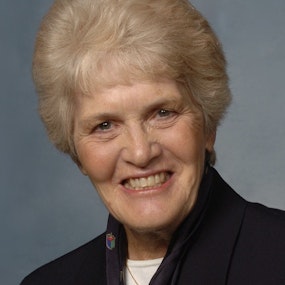
Streit, Marlene
Amateur Golfer
Marlene Stewart Streit is quite simply the most successful amateur golfer in Canadian history. Her career spans more than five decades with at least one major amateur victory in each. She won at home – 11 Canadian Ladies Open Amateurs, nine Canadian Ladies Close Amateurs and four Canadian Ladies Senior Women’s Amateur tournaments – and abroad, where she is the only woman ever to win the Canadian, British, American, and Australian amateur titles. In 2004, she rightfully became the first Canadian member of the World Golf Hall of Fame.
Stewart-Streit was born March 9, 1934, in Cereal, Alberta. At 15, she began riding her bicycle to The Lookout Point Golf Club, in Fonthill, Ontario, located in the southwestern region of the province, and caddy, using the money she earned to pay the $25 club membership fee. The club pro, Gordon McInnis Sr., began giving her lessons and a year after taking up the game, she finished runner-up in the Ontario Junior Girls’ Championship. Soon she would become a national figure. For winning the 1953 British Women’s Amateur, she received a heroine’s welcome. In Toronto, 15,000 people cheered as she drove by in an open convertible.
“I did not live my life or play golf to reach this destination. As a lifelong amateur, I only played for the love of the game. For me it’s not about the destination, but the joy that comes from the journey.”
Short in stature, but a giant on the course, Stewart-Streit had a long, sweeping backswing and a big shoulder turn, getting every ounce of power out of her body that she could. Often, she didn’t hit…
Read More
New to FORE the Good of the Game?
Here are some great episodes to start with. Or, check out episodes by topic.
















